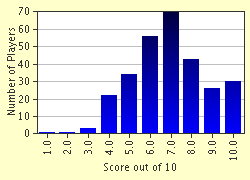Quiz Answer Key and Fun Facts
1. "A wise son maketh a glad father, but a foolish son is the heaviness of his mother." Is this quote from Proverbs, or Shakespeare?
2. Is this Shakespeare text or a verse from Proverbs? "If thou be wise, thou shalt be wise for thyself: but if thou scornest, thou alone shalt bear it."
3. "Surely I am more brutish than any man, and have not the understanding of a man. I neither learned wisdom, nor have the knowledge of the holy. Who hath ascended up into heaven, or descended? Who hath gathered the wind in his fists? Who hath bound the waters in a garment? Who hath established all the ends of the earth? What is his name, and what is his son's name, if thou canst tell?" --What about it: does that quote come from Shakespeare, or from Proverbs?
4. Is the following oft-quoted text a Biblical proverb, or a Shakespeare citation? "Cowards die many times before their deaths; the valiant never taste of death but once."
5. "All that glisters is not gold." Is that a Shakespeare quote, or is it taken from Proverbs?
6. "Be not wise in thine own eyes." Is this one a Shakespeare quote, or is it taken from Proverbs?
7. Is this Shakespeare text or a verse from Proverbs: "Love looks not with the eyes but with the mind."
8. One more short quote--is it from Shakespeare, or is it a Bible proverb? "Ill deeds are doubled with an evil word."
9. "Riches profit not in the day of wrath: but righteousness delivereth from death." Is this quote from Proverbs, or Shakespeare?
10. "Give strong drink unto him that is ready to perish, and wine unto those that be of heavy hearts. Let him drink, and forget his poverty, and remember his misery no more." Is this quote from Proverbs, or Shakespeare?
Source: Author
avrandldr
This quiz was reviewed by FunTrivia editor
agony before going online.
Any errors found in FunTrivia content are routinely corrected through our feedback system.

